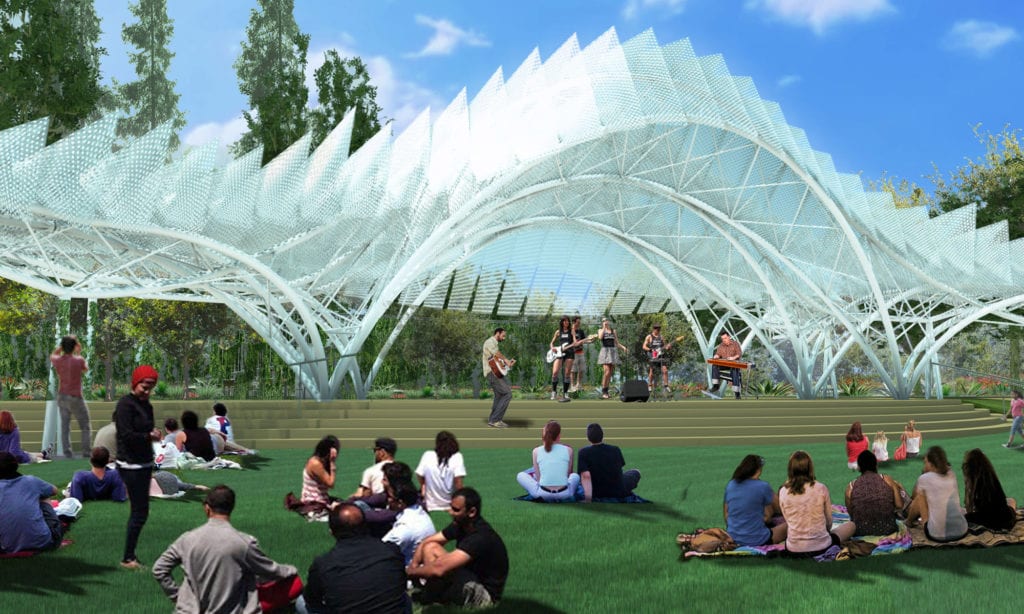A lawsuit continues to obstruct plans to breathe life into a troubled park in downtown San Jose.
Local residents approached a national foundation nearly a decade ago with an idea to build an outdoor music venue at St. James Park, with the hopes it would turn the space into an iconic downtown destination. But as the project gained momentum last year, a nearby men’s club challenged the city’s decision. An ongoing lawsuit has stalled the project that is more than half a decade in the making.
The 7.5-acre historic park, designed in the late 1800s by a famed landscape architect, has fallen victim to decades of urban decline and neglect, leading to blight, crime and homelessness. Lawmakers and nonprofits have spent years trying to turn it into a welcoming, family-friendly place. But those efforts, which include live music and yoga, didn’t last long due to lack of funding.
“We have worked to try and see how we can revitalize it, specifically so it’s going to be a park asset for the entire community,” Councilmember Raul Peralez told San José Spotlight. “It’s really important that we take full advantage of the green space that we do have.”
In 2016, the city, in partnership with Mortimer & Mimi Levitt Foundation, announced the pavilion plan at St. James Park. The foundation is known for reinvigorating some of the grittiest public parks in the U.S., including the historic MacArthur Park near downtown Los Angeles once plagued with gangs, drugs and crime.
But the project hit a legal snag shortly after San Jose approved the design for the new St. James Park in October 2020.
The Sainte Claire Historic Preservation Foundation, the second-oldest men’s social club in the state, filed a lawsuit against the city last November, claiming San Jose violated the state’s environmental review process and its own historic preservation rules.
Court documents show the city and men’s club unsuccessfully tried to settle the matter in February—halting plans for the pavilion.
“The lawsuit is ongoing at the moment,” Peralez said. “We’re hoping to resolve it sooner than later.”
Shawn Atkisson, executive director of the Sainte Claire Club, declined comment because of the lawsuit. A city spokesperson also declined to answer questions about the project.

A community asset
Under the current revitalization plan, St. James Park would feature a café, two dog parks and a playground, among other things, in addition to the outdoor pavilion. The pavilion could host between 50 to 300 events each year, including concerts, film festivals and dance and theater performances, with a capacity of 5,000 people.
“This will be a jewel and an asset to the entire community,” Fil Maresca, board chair of Friends of Levitt Pavilion San Jose, told San José Spotlight. The nonprofit receives support from the Levitt Foundation. “People are afraid to come to this park now and it’s a shame because it is one of the most beautiful locations in the downtown.”
The Levitt Foundation commits to a grant of $500,000 to help with construction costs, while the local nonprofit would host 50 free, family-friendly concerts each year, according to the proposal.

The plans are not without drawbacks. The new pavilion would have “significant and unavoidable” impacts on the historic character of the park, according to the city’s environmental impact report from last year. The new additions would also increase noise for the surrounding neighborhoods.
The Sainte Claire Club argues in its lawsuit that San Jose violated its own rules, which prohibit approval of a project that is “detrimental to a historic district or to a structure.” It further claims the city failed to sufficiently study potential impacts of the project in accordance to state regulations.
The complaint asks the court to reverse the city’s approval of the project and conduct another environmental study. Peralez defended the city’s process, saying San Jose “analyzed everything adequately.”
Maresca said the lawsuit should have been a last resort, not a first step.
“I was disappointed because a lot of these questions could have been answered without that legal piece of paper,” he said.
As of late October, the lawsuit is set to proceed with a hearing scheduled for Feb. 23, 2022.
Planning ahead
According to Maresca, the city, Levitt Foundation and Friends of Levitt Pavilion will enter a three-way agreement early next year—and his group is already working on details for the next design phase of the pavilion project.
Even without the lawsuit, the project is not guaranteed. The city and its partners have not secured all $63.9 million needed to fund the revitalization project, Peralez said.
The Friends of Levitt Pavilion commits to start fundraising $5 million for the project next year, Maresca said. The city has set aside $7 million through its St. James Park management fund.
San Jose and its partners will have to work out how to support the project once they enter the agreement next year, Maresca said.
“There’s still a lot of steps that need to happen obviously,” Maresca said. “But we are not letting it stop our forward momentum.”
Lloyd Alaban contributed to this report.
Contact Tran Nguyen at [email protected] or follow @nguyenntrann on Twitter.



Leave a Reply
You must be logged in to post a comment.